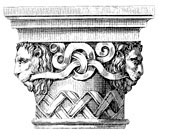
Ev’ry Knee Shall Lock
GUEST COLUMN
The U.S. Conference of Catholic Bishops has said that “The norm for reception of Holy Communion in the dioceses of the United States is standing.” While no one who kneels is supposed to be denied Communion, and while the Holy See says it’s “completely appropriate” to kneel, the bishops say that those who kneel should be given “proper catechesis” by the priest on why they should stand. In other words, those who kneel should be browbeaten and made to feel disobedient. (Also, while the norm for the U.S. Church is to kneel during the Eucharistic Prayer, certain bishops allow or encourage standing.)
For those parishes that have already de-sacralized the Eucharist through bland architecture, tacky art, improper vestments, p.c.-altered texts, bubble-gum style music, and hymn texts bordering on the heretical, this further erosion of respect for the Blessed Sacrament will simply be taken in stride.
However, there are those few parishes where traditional hymns are still sung. Lest these hymns be construed as promoting disobedience to the USCCB’s norm of standing to receive Communion, the following alterations will no doubt soon be made (many hymns have already been “inclusivized,” so get ready):
ORIGINAL: …Cherubim and Seraphim, falling down before thee
CORRECTED: …Cherubim and Seraphim, standing up before thee
(“Holy, Holy, Holy.” Text: Reginald Heber 1783-1826)
ORIGINAL: At the name of Jesus Ev’ry knee shall bow
CORRECTED: At the name of Jesus Ev’ry knee shall lock
You May Also Enjoy
There is a legend that a thousand years after the birth of Christ, Prince Vladimir…
The Church is the mother of Christendom. She encompasses all modes of life, from economy to culture, from politics to family relations.
To all the people not theologically schooled, a definite message has been communicated about the meaning (or lack thereof) of the Eucharist.

